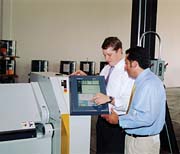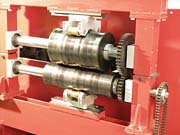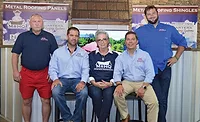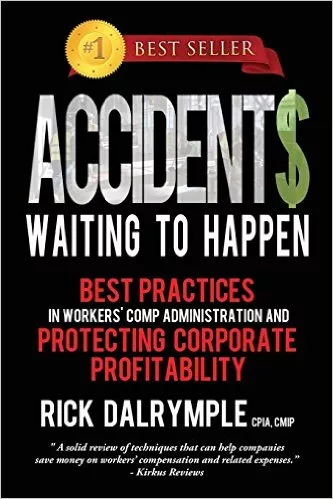Alliances Forged in Metal
The metal roofing segment seems particularly suited for strong alliances throughout the distribution chain. A basis for loyalty and strong bonds can be found in the intense investment of machines, materials and expertise that metal roofing calls for. Coupled with the material's longevity, these roofing alliances can be worth their weight in gold.
There are a number of trade groups with a strict focus on metal roofing; potential competitors working on mutual goals. A variety of business models that formally align manufacturers, distributors and contractors are being executed to capitalize on market share. For example, Englert Inc., Perth Amboy, N.J., opened its 14th office in Chicago this summer with the announcement of a new alliance with RAS Systems LLC, Peachtree City, Ga., which makes sheet metal roofing equipment.
"I think our relationship with Englert is especially good," says Justin Zimmerman of RAS Systems. "Englert really gives us that presence in front of the roofing and architectural market. It really complements their product line as well."

Forming Panels and Alliances
All roofing producers-from single-ply to shingles-try to form a strong bond with their customers. When products are viewed as commodities, brand awareness becomes a valuable marketing tool that must be carefully created and maintained. Beyond that, there are incentives and approved/certified contractor status that can build revenue at both ends and feed off each other.In metal roofing, the bonds appear particularly strong as contractors become married to a profile, line of equipment or supplier that meets their needs time and again. Such alliances need to be formed as carefully as a standing-seam panel. Last year MBCI, a manufacturer of factory-formed metal roofing panels, approached MetalForming Inc., Peachtree City, Ga., about entering the lucrative market of forming panels at the job site. MBCI would still continue to produce panels on fixed-roll mills that can cost $500,000, but would capitalize on the undeniable potential of portable roll formers (PRFs).
The rapid growth in PRFs helped build market share, but it also cut into sales of factory panel producers. While PRFs have been around for decades, it wasn't until recently that industry fixtures like MBCI decided to join the fray.
MBCI took a cautious approach since it was putting its reputation on the line, not to mention warranties, licensing, engineering and testing. "We at MBCI have been very protective of our products," says Wayne Dickinson, executive vice president of MBCI. "In the beginning, we were very concerned that on-site rollforming equipment would not be able to produce the same quality. After many months of working with the engineers at Schlebach and the [MetalForming] people, we believe that the portable machines involved in this license program will produce quality products if maintained and operated properly."
Roofing contractors will now be licensed to manufacture MBCI profiles on site with access to a complete line of painted coils, accessories, warranties and product testing. Demands from the design community can be met with engineering documents and single-source warranties, something that Dickinson has seen growing in popularity.
"Our intention when we began marketing our single-source warranty was to put some teeth in warranties," says Dickinson, "so the owner/architect is assured of getting a quality roof that will give them many years of leak-free service. The key to a successful program that promotes single-source responsibility is involvement by the manufacturer up front in the design phase of a project."
According to Geoff Stone, president/owner of MetalForming Inc., the two companies worked with MetalForming's manufacturer-Schlebach in Germany-to create a new portable machine that duplicates the smooth finish of larger machines. Material had to be fed through differently, sealants should be automatically applied and it still needed to fashion five profiles without changing the rollers. The result was the Schlebach Quadro FLX with 14 stations (as opposed to 10 on the previous model), which provides panels that everyone agrees are comparable with those produced by MCBI's plants.
"They were very, very stringent in their requirements with us," says Stone. "We basically designed a product for their performance. What this does is it begins to raise the whole bar for portable roll formers."
More than purchasing a machine, the roofing contractor enters an on-going relationship with the MBCI/MetalForming alliance. MetalForming sells and services all equipment while qualified contractors can offer products and support unavailable to other customers. The cost is more, but Stone believes that price is not an overriding principle-volume is. "This program is for the larger contractor who really wants to compete at the highest level," he explains. "The contractor wants control of the job."

One for All
That control exists through trust in the alliance and Stone admits that he's aiming for an elite market. Those seeking to rise above the crowded metal roofing segment can provide a system that is controlled throughout the entire process, from manufacturing to installation. Sometimes just getting in front of your customers when they're in a purchasing mode makes all the difference in the world.After Englert approached RAS Systems during the MetalCon show in Tampa last year, a partnership formed that covered marketing and service, and left room to grow. Englert will cover nearly every state and give both companies greater presence in metal roofing. Englert, which serves both sheet metal and roofing contractors, will be able to expand its product line and RAS gets greater access to the roofing market.
"We want people to recognize Englert and RAS are together," says Zimmerman. "We've been a strong leader in the industry. With this Englert venture, we're really taking it to the next level."
Englert gave away a Metalman Multi-Panel Machine during the grand opening of its Chicago office, which will allow future demonstrations of computerized folders and shears. Zimmerman recently finished training about a dozen Englert sales reps to help create an extension of the sales force and-down the road-a service force. He also feels that the regional trade shows attract many medium-sized contractors who don't frequent the national shows and present an untapped market. More open houses are in the works to get future customers to try out the machines for themselves.
"That's the way to sell it," he says regarding hands-on product demonstrations. "That's really where the customer sees the benefits. It gives them a first hand look at how it works."
Although RAS will still use around 20 distributors, the agreement with Englert gives them instant access to roofing customers. For Englert, it enhances the company's ability to offer single-source warranties, a growing demand in roofing systems. Although the company has traditionally positioned itself as a full-service supplier of metal roofing materials and equipment, its roofing contractor customers were bidding more and more jobs that called for multiple material types. Since a good portion of the metal roofing business involves mansards, fascias and other architectural elements, it made sense to perform as much of the application process as possible, for contractors and manufacturers.
Kevin Corcoran, vice president of Englert Inc., believes single-source warranties have potential in the public sector market, particularly schools that are not getting their money's worth.
"It's meant for high-end, high-profile projects ... public buildings that people expect to last 50 years," he says. "We're not looking for a lot of work."
Englert not only distributes domestic and European machines, but also has positioned itself to be a manufacturer for all metal roofing needs...and beyond. Corcoran mentioned another new agreement with a "major" single-ply producer to compete in more bids and he is even looking for partners in the solar industry (see news item on page 10).
While Englert prides itself on lasting relationships-it has distributed Knudson machines since 1966-Corcoran says that a series of roofing projects in the Cayman Islands (Roofing Contractor, Feb. ‘04, pg. 49) and California encouraged him to explore offering more comprehensive warranties. "We're finding a lot of interest in the design community for a single-source warranty," says Corcoran, adding that his company makes sure that a profit center doesn't become an expense. "We don't have exclusions. It's got real teeth to it. It's not available to anybody other than certified contractors."
Whether it's incorporating Roof Hugger purlins into its warranty or offering an expanded line of components, Englert is building a reputation for forging new relationships with companies whose machines and products complement its business plan. Corcoran can even create profit centers for roofing contractors who are missing out on a critical component. "We're selling gutter machines like hotcakes," he says. "The gutter installation is a very unique business. Painters are buying [machines] because they can't get anybody to install gutters."
And to Corcoran, the machine is key. "The machine is the most important part of the relationship," he says. Englert leverages that initial purchase into an on-going affiliation that provides warranties, testing, engineering and certification. "It's a whole program. We're constantly looking for ways to add value to what our customers are offering."
In an age where more owners and architects want to deal with one person when it comes to the roofing system, Englert is happy to handle the marketing, sales, warranty and contractor relations. Although the company has offered a weather-tight warranty since 1991, Corcoran believes that any such claim should directly involve the contractor, hence the certification program. Englert's aggressive courting of partners shows that sometimes building an alliance takes nothing more than asking: "They told us ‘You're the first guys who approached us,'" Corcoran says.
Looking for a reprint of this article?
From high-res PDFs to custom plaques, order your copy today!






